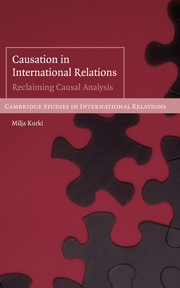Book contents
- Frontmatter
- Contents
- List of figures
- Acknowledgements
- Introduction: the problem of causation and the divided discipline of International Relations
- Part I The Humean philosophy of causation and its legacies
- 1 The Humean philosophy of causation and its legacies in philosophy of science
- 2 Controversy over causes in the social sciences
- 3 Humeanism and rationalist causal analysis in International Relations
- 4 Reflectivist and constructivist approaches in International Relations: more cases of Humeanism
- Part II Rethinking the concept of cause
- Part III Reconfiguring causal analysis of world politics
- References
- Index
- CAMBRIDGE STUDIES IN INTERNATIONAL RELATIONS
4 - Reflectivist and constructivist approaches in International Relations: more cases of Humeanism
Published online by Cambridge University Press: 22 September 2009
- Frontmatter
- Contents
- List of figures
- Acknowledgements
- Introduction: the problem of causation and the divided discipline of International Relations
- Part I The Humean philosophy of causation and its legacies
- 1 The Humean philosophy of causation and its legacies in philosophy of science
- 2 Controversy over causes in the social sciences
- 3 Humeanism and rationalist causal analysis in International Relations
- 4 Reflectivist and constructivist approaches in International Relations: more cases of Humeanism
- Part II Rethinking the concept of cause
- Part III Reconfiguring causal analysis of world politics
- References
- Index
- CAMBRIDGE STUDIES IN INTERNATIONAL RELATIONS
Summary
Since the 1980s many new theoretical approaches have come to play an increasingly important role in IR. These approaches, encompassing poststructuralism, critical theory, feminism and constructivism, are commonly referred to as ‘postpositivist’ or ‘reflectivist’ because of their reluctance to endorse the mainstream rationalist conception of how to study world politics. They have sought to challenge the narrow focus of the mainstream IR debates by opening up new avenues for investigation, notably the study of the role of ideas, norms, rules and discourses, as well as the examination of processes of social construction and socialisation. The goal of this chapter is to examine the treatment of the concept of cause among the ‘postpositivist’ and ‘reflectivist’ theorists. The approaches examined here are often called ‘constitutive’ theoretical approaches in IR: this is because these approaches tend to reject, or at least delimit, the idea of ‘causal theorising’ in IR scholarship in favour of investigating how world politics is ‘constituted’ through ideas, rules, norms or discourses. It will be seen that even though these positions are sceptical of causal theorising and terminology, nevertheless they tend to reinforce the influence of the Humean discourse of causation in IR. This is because when they reject causal analysis, they reject it on the basis of having accepted, often inadvertently, core Humean assumptions regarding the nature of causation. The inability of more radical reflectivists, as well as of most constructivists, to conceptualise causation beyond the assumptions of Humeanism has some important consequences.
Information
- Type
- Chapter
- Information
- Causation in International RelationsReclaiming Causal Analysis, pp. 124 - 144Publisher: Cambridge University PressPrint publication year: 2008
